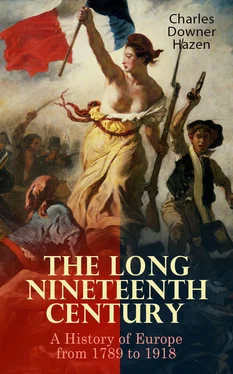Louis XVI, wounded in his conscience, now planned to escape from Paris, to go to the eastern part of France, where there were French troops on which he thought he could rely. Then, surrounded by faithful adherents, he could reassume the kingly role and come back to Paris, master of the situation.
Disguised as a valet the King, accompanied by the Queen, disguised as a Russian lady, escaped from the Tuileries in the night of June 20, 1791, in a clumsy coach. All the next day they rolled over the white highways of Champagne under a terrible sun, reaching at about midnight the little village of Varennes, not far from the frontier. There they were recognized and arrested. The National Assembly sent three commissioners to bring them back. The return was for these two descendants of long lines of kings a veritable ascent of Calvary. Outrages, insults, jokes, ignominies of every kind were hurled at them by the crowds that thronged about them in the villages through which they passed a journey without rest, uninterrupted, under the annihilating heat, the suffocating dust of June. Reaching Paris they were no longer overwhelmed with insults, but were received in glacial silence by enormous throngs who stood with hats on, as the royal coach passed by. The King was impassive but "our poor Queen," so wrote a friend, " bowed her head almost to her knees." Rows of National Guards stood, arms grounded, as at funerals. At seven o'clock that night they were in the Tuileries once more. Marie Antoinette had in these few days of horror grown twenty years older. Her hair had turned quite white, "like the hair of a woman of seventy."
The consequences of this woeful misadventure were extremely grave. Louis XVI had shown his real feelings. The fidelity of his people to him was not entirely destroyed but was irremediably shaken. They no longer believed in the sincerity of his utterances, his oaths to support the Constitution. The Queen was visited with the King's contumely, being regarded as the arch-conspirator. The flight throne was undermined. A republican party appeared. Before this no one had considered a republic possible in so large a country as France. Republics were for small states like those of ancient Greece or medieval Italy. Even the most violent revolutionists, Robespierre, Danton, Marat, were, up to this time, monarchists. Now, however, France had a little object lesson. During the absence of the King, the government of the Assembly continued to work normally. In the period following, during which Louis XVI was suspended from the exercise of his powers, government went on without damage to the republican state. A king was evidently not indispensable. It has been correctly stated that the flight to Varennes created the republican party in France, a party that has had an eventful history since then, and has finally, after many vicissitudes, established its regime.
But this republican party was very small. The very idea of a republic frightened the Constituent Assembly, even after the revelation of the faithlessness of the King. Consequently, in a revulsion of feeling, the Assembly, after a little, restored Louis XVI to his position, finished the Constitution, accepted his oath to support it, and on September 30, 1791, this memorable body declared its mission fulfilled and its career at an end.
The National Assembly before adjournment committed a final and unnecessary mistake. In a mood of fatal disinterestedness it voted that none of its members should be eligible to the next legislature or to the ministry. Thus the experience of the past two years was thrown away and the new constitution was intrusted to hands entirely different from those that had fashioned it.
Chapter V
The Legislative Assembly
Table of Contents
The Constitution was now to be put into force. France was to make the experiment of a constitutional monarchy in place of the old absolute monarchy, gone forever. In accordance with the provisions of the document a legislature was now chosen. Its first session was held October 1, 1791. Elected for a two-year term, it served for less than a single year. Expected to inaugurate an era of prosperity and happiness by applying the new principles of government in a time of peace, to consolidate the monarchy on its new basis, it was destined to a stormy life and to witness the fall of the monarchy in irreparable ruin. A few days before it met Paris, adept, as always, in the art of observing fittingly great national occasions, had celebrated 'the end of the Revolution.' The Old Regime was buried. The new one was now to be installed.
But the Revolution had not ended. Instead, it shortly entered upon a far more critical state. The reasons for this unhappy turn were grave and numerous. They were inherent in the situation, both in France and in Europe. Would the King frankly accept his new position, with no mental reservations, with no secret determinations, honestly, entirely? If so, and if he would by his conduct convince his people of his loyalty to his word, of his intention to rule as a constitutional monarch, to abide by the reforms thus far accomplished, with no thought of upsetting the new system, then there was an excellent chance that the future would be one of peaceful development, for France was thoroughly monarchical in tradition, in feeling, and in conviction. The Legislative Assembly was as monarchical in its sentiments as the Constituent had been. But if the King's conduct should arouse the suspicion that he was intriguing to restore the Old Regime, that his oaths were insincere, then the people would turn against him and the experiment of a constitutional monarchy would be hazarded. France had no desire to be a republic, but it had a fixed and resolute aversion to the Old Regime.
Inevitably, since the flight to Varennes, suspicion of Louis XVI was widespread. The suspicion was not dissipated by wise conduct on his part, but was increased in the following months to such a pitch that the revolutionary fever had no chance to subside but necessarily distrust of mounted steadily. The King's views were inevitably colored by his hereditary pretensions. Moreover, as we have seen, the religious question had been injected into the Revolution in so acute a form that his conscience as a Catholic was outraged. It was this that strained to the breaking point the relations of the Legislative Assembly and Louis XVI. The Civil Constitution of the Clergy gave rise to a bitter and distressing civil war. In the region known as La Vendee several thousand peasants, led by the refractory or non-juring priests, rose against the elected, constitutional priests and drove them out of the pulpits and churches. When the National Guards were sent among them to enforce the law, they flew to arms against them, and civil war began.
The Assembly forthwith passed a decree against the refractory priests, which only made a bad matter worse. They were required take the oath to the Civil Constitution within a week. If they refused they would be considered 'suspicious' characters, their pensions would be suppressed, and they would be subject to the watchful and hostile surveillance of the government. Louis XVI vetoed this decree, legitimately using the power given him by the Constitution. This veto, accompanied by others, offended public opinion, and weakened the King's hold upon France. It would have been better for Louis had he never been given the veto power, since every exercise of it placed him in opposition to the Assembly and inflamed party passions.
The other decrees which he vetoed concerned the royal princes and the nobles who had emigrated from France, either because they no longer felt safe there, or because they thought that by going to foreign countries they might induce their rulers to intervene in French affairs and restore the Old Regime. This was wanton playing with fire. For the effect on France might be the very opposite of that intended, might so heighten and exasperate popular feeling that the monarch would be in greater danger than if left alone. This emigration, mostly of the privileged classes, had begun on the morrow of the storming of the Bastille. The Count d'Artois, younger brother of Louis XVI, had left France on July 15, 1789. The emigration became important in 1790, after the decree abolishing all titles of nobility, a decree that deeply wounded the pride of the nobles, and it was accelerated in 1791, after the flight to Varennes and the suspension of the King. It was later augmented by great numbers of non-juring priests and of bourgeois, who put their fidelity to the Catholic Church above their patriotism.
Читать дальше












